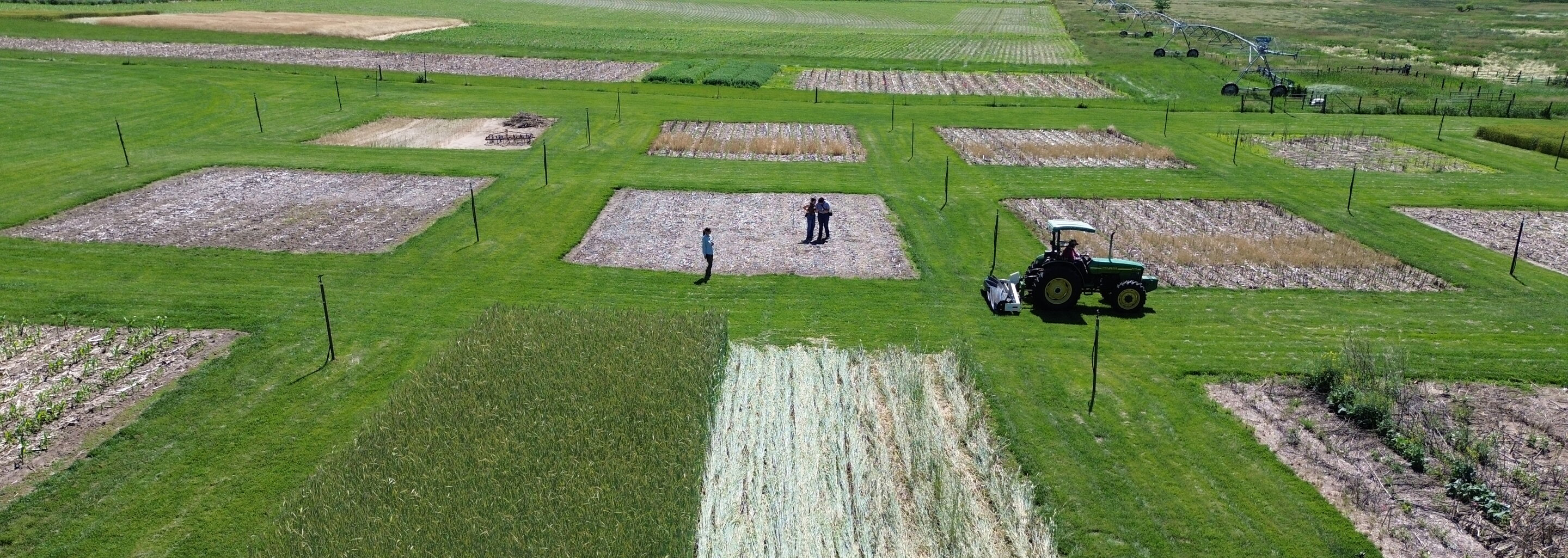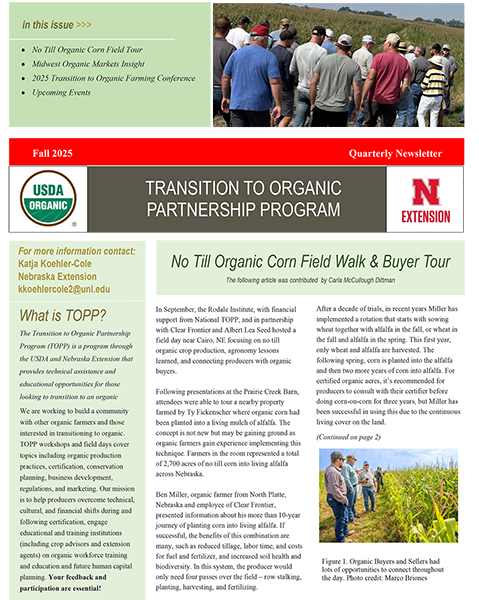Organic Farming In Nebraska
In Partnership with the Transition to Organic Partnership Program (TOPP)

Transition to Organic Farming Conference
Tuesday, Dec. 2, 2025
Eastern Nebraska Research, Extension and Education Center, near Mead
2025 Transition to Organic Farming Conference
Discover how Nebraska farmers are making organic systems work — from no-till row crops to marketing and on-farm innovation — alongside researchers and industry experts. Join producers, researchers and extension experts for a full day of learning focused on practical strategies for successful organic grain production.
The Nebraska Organic Conference offers opportunities to:
- Connect with other organic and transitioning farmers from across the region
- Learn from growers sharing real-world experiences
- Hear from researchers on current trials and long-term organic systems studies
- Explore market and value-added opportunities for organic grains
The 2025 Transition to Organic Farming Conference runs from 8:30 a.m.–4 p.m. Dec. 2 at ENREEC, 1071 County Rd. G, Ithaca, Nebraska. The conference is free and includes lunch.
For more information, contact Katja Koehler-Cole, 402-504-1016. This event is sponsored by Nebraska Extension and USDA TOPP.
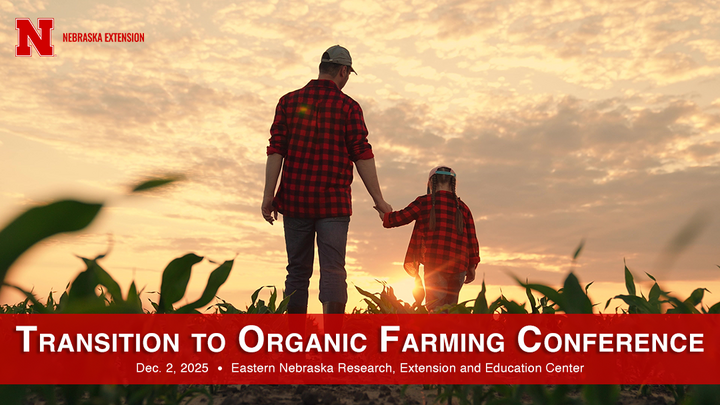
Content
Organic crop and livestock production offers opportunities for growers wanting to diversify their operation while often gaining a higher price for their product.
Nebraska Extension in partnership with the Transition to Organic Partnership Program (TOPP) have a variety of resources for farmers/ranchers interested in organic farming.
Archive issues
Contact:
Katja Koehler-Cole
Extension Educator & State SARE Co-coordinator
(402) 624-8042
kkoehlercole2@unl.edu
Faculty Bio
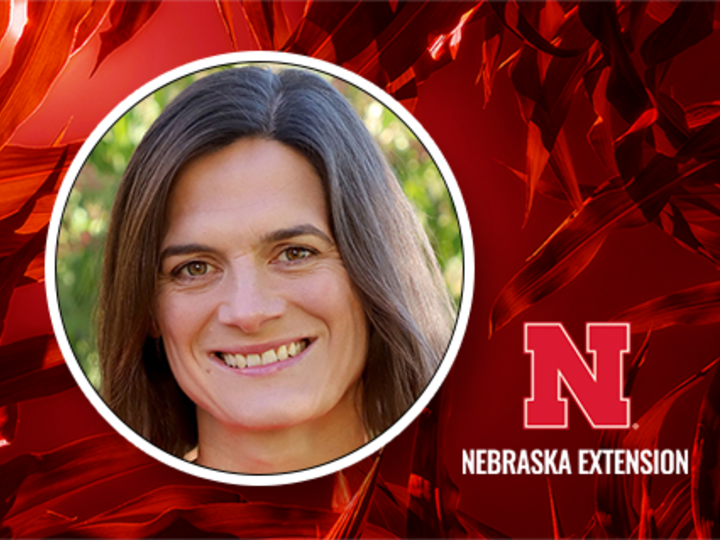
Frostseeding red clover
Red Clover as a Living Mulch
In organic crop rotations, red clover can be an important source of N as we found in previous studies. A new trial was established this March testing the ability of red clover to function as a living mulch for organic corn.
Article: Undersowing Red Clover Into Winter Wheat as an N Source for Corn
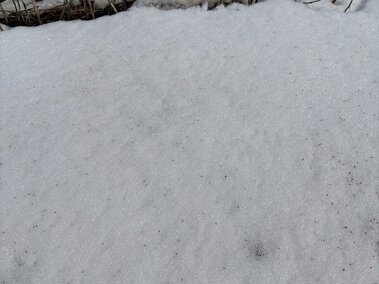
Red clover seed broadcast on snow, March 21, 2025. (Katja Koehler-Cole | Nebraska Extension)
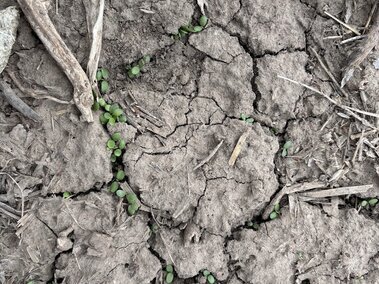
Clover seed emerging in soil cracks, April 1, 2025. (Katja Koehler-Cole | Nebraska Extension)
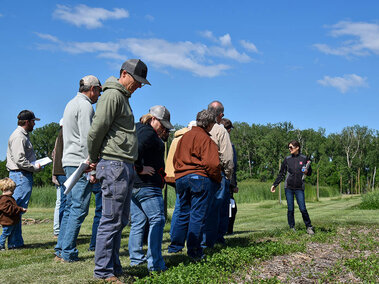
Visitors checking out clover and newly planted corn. Photo taken on May 22, 2025. (Abigayle Warm | ENREEC/UNL)
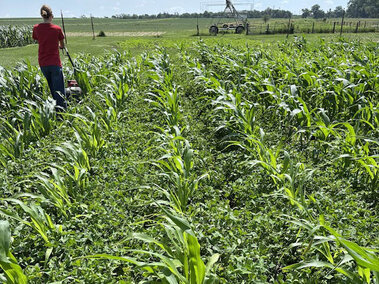
Clover is going strong. We are managing it by mowing. Photo taken on June 25, 2025. (Katja Koehler-Cole | Nebraska Extension)
Upcoming Organic Production Events
Dec. 2, 2025 Annual Transition to Organic Farming Conference - Eastern Nebraska Research, Extension and Education Center, 1071 County Rd G, Ithaca, NE
Organic Production Resources
USDA Organic Certification
In order to sell products as organic, farmers, ranchers or processor must first become certified by a National Organic Program accredited certifying agency.
In 2002 the NOP was established through the United States Department of Agriculture to provide legal and consistent regulations and certification procedures which apply to production and processing of all produce sold as organic in the U. S.
- Certification is a yearly cost and a farmer should evaluate whether he or she has enough organic product to sell in order to justify the cost.
- Farmers whose gross agricultural income from organic sales total $5,000 or less annually are exempt from certification under NOP 205.101 Exemptions and exclusions.
Guides for Becoming Certified
- The USDA National Organic Program (NOP) Handbook site includes links to USDA organic regulation documents and updates.
- Guidebook for Organic Certification, Answers to Common Certification Questions (order or download here) by the Midwest Organic and Sustainable Education Service (MOSES)
- Organic Certification and Accreditation — a USDA resource on organic certification basics, benefits of organic certification, how to become certified, and organic enforcement activities.
- USDA’s Organic Certifier Locator, in its INTEGRITY database, provides the most accurate information about accredited certifying agents and is updated regularly by the NOP and certifying agents.
- Sound and Sensible — Resources from a USDA project with 14 contractors to make organic certification more accessible, attainable, and affordable.
- Essentials of USDA's Organic Livestock Requirements
Additional Certification Programs
- IFOAM-International Federation of Organic Agriculture Movements
IFOAM's mission is leading, uniting, and assisting the organic movement in its full diversity. Its goal "is the worldwide adoption of ecologically, socially, and economically sound systems that are based on the principles of Organic Agriculture."
Disclaimer: Reference to commercial products or trade names in these publications is made with the understanding that no discrimination is intended and no endorsement by University of Nebraska-Lincoln is implied.
Transitioning to Organic Farming
Planning the Transition to Organic Crop Production
This Nebraska Extension NebGuide (G2282) is a resource to help farmers assess their current and intended operations and choose practices for a successful transition to organic production. Topics include management of weeds, soil fertility, and crop rotations; typical crop rotations for eastern and western Nebraska; integration of a market-based strategy; and development of a business plan and record-keeping system.
Organic Transition Planner
The Organic Transition Planner explores strategies for developing a business transition plan through goal — planning, market opportunities, financing and human resources with real —life examples from transitioning farmers. Find downloadable detailed worksheets and other transitioning tools to accompany this planner at https://www.misa.umn.edu/publications/organictransitionplanner.
USDA Information for Transitioning to Organic Farming
USDA Expands Insurance Options for Farmers Transitioning to Certified Organic Agriculture. Producers transitioning to certified organic production can now use the Contract Price Addendum to cover their crops at a higher price than traditional crops. The Contract Price Addendum allows farmers transitioning to organic production to ensure certain crops at their contract price rather than the published U.S. Department of Agriculture (USDA) Risk Management Agency (RMA) price election. See further information at USDA Risk Management Agency.
The Whole-Farm Revenue Protection program (WFRP) is tailored for any farm with up to $8.5 million in insured revenue, including farms with specialty or organic commodities (both crops and livestock), or those marketing to local, regional, farm-identity preserved, specialty, or direct markets. The Midwest Organic and Sustainable Education Service offers a fact sheet on the WFRP program, Crop Insurance for Specialty Crop Growers: Whole Farm Revenue Protection.
Eqip Organic Transition Program. The USDA-NRCS has a special program within their EQIP program for transitioning to organic production. Details of the EQIP Organic Transition Program vary by county. Contact your local Natural Resources Conservation Service (NRCS) office for more information. Center for Rural Affairs has been working with NRCS's EQIP program and the organic certification process.
The Farm Service Agency (FSA) can help with the cost of transitioning to organic production, including organic certification (up to 75% of certification costs each year up to $750).
Farm Management
Science-based Organic Farming Guide 2010: Toward Local and Secure Food Systems
From the University of Nebraska Extension and the Center for Applied Rural Innovation (CARI), this 106-page guide provides background on the science of organic crop, soil fertility and livestock management, as well as organic gardening, local food systems and economics of organic agriculture. (PDF 786 KB)
FieldWatch
This site, which includes FieldWatch, DriftWatch, and BeeCheck, helps identify locations within the state where sensitive crops such as grapes and organics are grown. After site locations are input in the system by a producer, a pesticide applicator can locate those sites near them and take appropriate action to avoid injuring the crop with herbicide drift.
Farm Business Planning
AgBiz Logic (ABL)
AgBiz Logic (ABL) is a user-friendly suite of digital financial tools for farmers and ranchers developed by Oregon State University in partnership with regional and national climate hubs and USDA-NIFA.
The first step in the online process is to choose between importing federal tax returns, farm accounting system data, or university farm enterprise budgets (if you don’t have your own data). Use the tools to compare the profitability of various scenarios, such as changing a crop rotation or replacing labor with capital. Use the AgBizClimate module to assess the effect of high or low projections of growing degree days or number of cold snaps on crop yields (for your county anywhere in the U.S.). Resources on the website include student course materials and case studies using ABL.
Current and Projected Whole Farm Financial Spreadsheets
Download Excel® spreadsheets to compile current and five-year projected whole-farm income and cash flow, balance sheets, inventory changes, and depreciation expenses as described in Organic Transition: A Business Planner for Farmers, Ranchers and Food Entrepreneurs. Find more related resources at eOrganic Tools for Organic Transition Project.
AgPlan
A multi-year enterprise plan can be written using a business plan outline for transitioning to organic farms on the University of Minnesota AgPlan interactive website. An overview of Agplan is available at http://cffm.umn.edu/products/AgPlan.aspx.
Budgeting
FINPACK
This University of Minnesota farm financial planning software draws on records in the FINBIN database from thousands of agricultural producers using FINPACK as their farm business analysis and summary program.
USDA Market News Organic Reports
USDA Market News provides price, volume, and other related information for commodities and products that have been grown, processed and certified to USDA’s National Organic Program standards.
Organic Crops and Livestock
In Nebraska corn, barley, edible beans, millet, oats, soybeans, wheat, alfalfa and other forages are grown here and marketed organically. Other organic crops such as amaranth, popcorn, blue corn, and spelt are grown under contract for a premium.
Figure 1. Organic crop rotations for eastern Nebraska. (Excerpted from the NebGuide, Planning the Transition to Organic Crop Production, G2282)
Rotations
Rotations vary by region. In western Nebraska, a stacked three-year rotation of winter wheat/millet/fallow/winter wheat/sunflower/fallow has been successful at the High Plains Ag Lab. If there is adequate soil moisture, the fallow phase after millet can sometimes be replaced with winter field pea that's plowed under in early June. In eastern Nebraska a seven-year rotation of soybeans/winter wheat/popcorn/alfalfa (three years)/corn has been used successfully at the South Central Agricultural Lab near Clay Center. Hairy vetch is planted after wheat harvest to provide nitrogen for the following popcorn crop.
Field Peas. Field peas are showing promise as a profitable cool-season crop in western Nebraska. Field peas add flexibility to the organic rotation, providing a window of opportunity for incorporating manure and growing cover crops prior to planting a winter small grain, and breaking cycles of weeds and pests that infest warm-season crops. See Replacing Summer Fallow with Grain-type Field Peas: New Markets, New Opportunities.
Cover Crops
- Midwest Cover Crops Council selector tools and publications
- Nebraska Cover Crop Research
- Organic No-till Vegetables: Harnessing the Power of Cover Crops
Ray Weil, soil health guru and professor at the University of Maryland, maintains this personal cover crop and soils website with research updates and information for farmers and educators.
Nebraska Extension Resources
In Nebraska, beef, goat, lamb, pork, and poultry are being produced organically. Livestock can also be certified organic. Pasture and cropland will need to be certified when producers plan on using their own forages to feed-out their livestock. Free-range and grass-fed organic production is gaining market with consumers interested in the health benefits derived from animals raised on grass.
Nutrient Management
The 2018 Nebraska Extension NebGuide, Nutrient Management in Organic Farming (G2295), provides guidance on nutrient management for certified organic crop production. It also has information valuable to conventional production, including content and availability of nutrients from various manure sources, composting, non-traditional biofertilizer products, and crop rotation suggestions. More detailed information on individual topics referenced in this NebGuide are available in the following publications:
- Software for Manure Management Planning and Whole Farm Nutrient Balance Calculations
- Soil Management for Increased Soil Organic Matter (NebGuide G2283)
- Management Strategies To Reduce The Rate Of Soil Acidification (Nebguide G1503)
- Management to Minimize and Reduce Soil Compaction (Nebguide G896)
- Manure Testing for Nutrient Content (NebGuide G1450)
- Determining Crop Available Nutrients from Manure (Nebguide G1335)
- Composting Manure and Other Organic Materials (NebGuide G1315)
- Nutrient Management for Agronomic Crops in Nebraska (Nebraska Circular EC155)
- Fertilizer Suggestions for Corn (Nebraska Circular EC117)
- Estimating Plant-Available Nitrogen Release from Cover Crops (PNW 636)
- Sampling for Plant Tissue Analysis (NMSU ACES Guide A-123)
- USDA NRCS Soil Quality Test Kit
Compendium of Research Reports on Use of Non-Traditional Materials for Crop Production
Evaluations of many biofertilizers and other non-traditional soil additives are searchable in this online database developed by Iowa State University. For example, searches for “soil inoculant,” “Azospirillum,” “fungal or VAM,” and "fish" retrieved 24, 5, 9, and 8 studies, respectively.
Building Soils for Better Crops
The third edition of SARE’s “Building Soils for Better Crops” by Fred Magdoff and Harold van Es includes effective management strategies to maintain soil organic matter using primarily on-farm, internal resources. The book details how fertility management can accompany appropriate crop and cover crop choices that influence soil structure and soil health, and also how to interpret soil test results for cost-effective soil fertility management.
Feeding the Soil
"Basic Concepts in Nutrient Management for Organic Farming” by Jonathan Deenik of the University of Hawaii covers “feeding the soil,” nutrient deficiencies and soil tests.
ATTRA’s Sustainable Soil Management Soil Systems Guide
"Sustainable Soil Management Soil Systems Guide” Understanding the principles by which native soils function can help farmers develop and maintain productive and profitable soil both now and for future generations. The soil, the environment, and farm condition benefit when the soil’s natural productivity is managed in a sustainable way. Reliance on purchased inputs declines year by year, while land value and income potential increase. Some of the things we spend money on can be done by the natural process itself for little or nothing. Good soil management produces crops and animals that are healthier, less susceptible to disease, and more productive.
Pest and Weed Management
Beneficial Insects
Beneficial Insects II (EC1579), by Robert J. Wright, Terry A. DeVries and Jim A. Kalisch at the University of Nebraska–Lincoln Department of Entomology
Beneficial Insects I (EC1578), by Robert J. Wright, Terry A. DeVries and Jim A. Kalisch at the University of Nebraska–Lincoln Department of Entomology
Managing Insects and Disease in Vegetable Crops
This video covers several topics, with the overall focus on organic pest and disease management. Speakers from Purdue, Ohio State University, and the University of Illinois address concerns specific to vegetable crops, including methods for managing and preventing pests and diseases.
Beetle Monitoring
One chemical–free way to deal with insect pests is to physically remove them from plants. As is typical of farming in general, organic pest control sometimes requires ingenuity. One practitioner, Ken Waters, has invented a handy tool to help with insect removal: the Super Dooper Beetle Scooper. The website also contains a variety of interesting current and past experiments with techniques, tools and organic inputs.
Healthy Soil, Fewer Pests
Michael Bomford, from Kentucky State University’s Organic Agriculture Working Group, makes the connection between supporting soil health and combating insects and weeds. Tillage, crop rotation, and other soil management methods can also help build strong plants and suppress pests. See Bomford's PowerPoint presentation.
Insect Management for Organic Farms
Ecological system approaches, “therapeutic” approaches, and Integrated Pest Management are all described in this presentation by Kim Stoner of Connecticut Agricultural Experiment Station. Find proceedings of a 1998 farmer/scientist conference coordinated by Dr. Stoner at “Alternatives to Insecticides for Managing Vegetable Insects.”
Insect Pest Management in Vegetable Crops
ATTRA’s document library is an invaluable resource for organic farmers, both new and experienced. The Guide: Insect Pest Management in Vegetable Crops from UC Davis’ Vegetable Research and Information Center, outlines the steps a farmer should take before planting in order to be assured of the least possible pests.
ATTRA's Pest Management
ATTRA-National Sustainable Agriculture Information Service is a rich source of information on all aspects of organic farming. From the ATTRA's Pest Management site: “Pest management sometimes seems especially challenging for farmers dedicated to sustainable, low–input practices. If you’re looking to meet the challenge, this series of publications can help. These resources offer a wide array of techniques and controls to effectively reduce or eliminate damage from insects, diseases and weeds without sacrificing the good of the soil, water, or beneficial organisms.”
Controlling Lettuce Aphids in Australia
Peter, Darren and Paul Horne relate their personal experience with controlling difficult pests using a biological approach. Skip over the first 2.5 minutes of this video to get to the gist of how Peter Schreurs & Sons control Lettuce Aphid using IPM approach they have been developing since 2000.
- Managing Canada Thistle in Organic Cropping Systems.
- Weed ‘Em and Reap. This two-part weed management video is available at eXtension’s website. Part 1 showcases tools and reduced tillage strategies for organic weed management. Part 2 features researchers and farmers demonstrating and describing organic reduced tillage vegetable production systems in West Virgina, North Carolina, and Montana. Organic reduced tillage strategies control weeds, improve soil quality, provide beneficial insect habitat, and in some cases reduce pest damage.
- Roller-crimping research at UNL resulted in the design and fabrication of a new concept crimper and an early-flowering high biomass triticale cultivar to provide mulch for suppressing weeds in soybeans and green snap beans.
- Flame-weeding research at UNL focusing on organic production resulted in the design and manufacture of an advanced flaming system for commercial crop production and guidelines for flaming weeds in various crops.
- Principles of Sustainable Weed Management in Organic Cropping Systems, 2011. This information packet was first developed by Mark Schonbeck for a 2009 Clemson University workshop for farmers and agricultural professionals. Schonbeck provides an ecological understanding and a 12-step process for managing weeds. The 2011 edition was updated with a review of research articles on weed ecology and integrated weed management in Weed Science Society of America publications.
Local Resources and Organizations
To connect with organic producers in Nebraska as well as other states, check the USDA Database of Organic Producers. Find a specific certified organic farm or business, or search for an operation with specific characteristics. Listings come from USDA-Accredited Certifying Agents.
Appropriate Technology Transfer for Rural Areas (ATTRA)
ATTRA is an agricultural program developed and managed by the National Center for Appropriate Technology (NCAT), headquartered in Montana, with offices in five other states. The ATTRA website provides over 300 downloadable publications written by ATTRA's sustainable agriculture specialists, a calendar of sustainable agriculture events throughout the U.S., and a list of farm internships and apprenticeships throughout Canada and the U.S.
Center for Applied Rural Innovations (CARI) is the focal point within the University of Nebraska–Lincoln for communities and individuals to obtain information and program support needed to enhance their economic and social well-being. CARI has developed some of the most community-driven and impact-oriented programs focusing on rural viability.
eOrganic is the organic agriculture community of practice with eXtension. The eOrganic website is a clearinghouse for articles, webinars, and videos, and provides the opportunity to “Ask an Expert” about commercial certified organic farming. eOrganic’s initial content focused on general organic agriculture, dairy production, and vegetable production, but eOrganic members are now developing content on other farming systems and topics. All content is collaboratively authored and peer-reviewed by eOrganic’s community of University researchers and Extension personnel, other agricultural professionals, farmers, and certifiers with experience and expertise in organic agriculture. Find eOrganic's resources for farmers, ranchers, agricultural professionals, certifiers, rsearchers, and educators at articles.extension.org/organic_production.
Environmental Quality Incentive Program (EQIP)
The USDA-NRCS has a special program within their EQIP program for transitioning to organic production. EQIP Organic Transition Program details may vary between counties. Contact your local Natural Resources Conservation Service (NRCS) office for more information. Center for Rural Affairs has been working with NRCS's - EQIP program and the organic certification process. Contact Martin Kleinschmit: 402-254-6893.
eXtension Organic Agriculture
A national website where America's land-grant universities share research-based organic production information via articles, videos, and webinars. Readers can also pose their questions to an Ask the Expert app or view questions and answers posted previously. Main topics include organic farming systems, certification, pest management, fertility, and seed production.
Kimmel Education and Research Center, Nebraska City
Offers the Inventors, Investors and Entrepreneurs Club (meets monthly), the annual Wild Fruit & Nut Jam event, and other educational and research efforts aimed at creating new economic opportunities and developing the entrepreneurial and leadership skills of individuals, organizations and communities.
Midwest Organic and Sustainable Education Service
The Midwest Organic and Sustainable Education Service (MOSES) is a nonprofit organization in Spring Valley, Wisconsin that provides education, resources and expertise for organic farmers to succeed. Education is delivered through farm tours, a monthly newsletter, and an annual organic conference that draws over 3,000 people each February to La Crosse, Wisconsin. Resources include comprehensive publications on marketing, business management, and certification guides, as well as a searchable resource database. Staff include organic specialists with organic farming experience and expertise in certification who answer farmers’ specific questions online and by phone.
Natural Resources Conservation Service on Soil Health
This highly inclusive NRCS website about soil quality includes multiple references to organic farming and other practices related to soil fertility and pest management.
Nebraska Sustainable Agriculture Society
Their Mission: To promote agriculture and food systems that build healthy land, people, communities and quality of life, for present and future generations. Vision and work:
"We recognize the essential relationship between healthy local agriculture and a strong local food system; a relationship that benefits from food to grown and processed locally. This adds quality and security, as well as social and ecological responsibility and benefits to the community. It is this understanding that motivates NSAS's work to strengthen and enhance these systems together. Our work spans across Nebraska.
"As a non-profit organization, we are proud of our diverse membership which includes farmers, rural and urban consumers, market gardeners, educators, families and restaurateurs. We welcome anyone who is concerned about family farming, environmental quality and good, healthy food!"
North Central Region - Sustainable Agriculture Research and Education Program (SARE)
SARE is a science-based, grassroots, problem-solving sustainable agriculture program conceived and funded by the U.S. Congress to advance—to the whole of American agriculture—innovations that improve profitability, stewardship and quality of life by investing in groundbreaking research and education. SARE awards competitive grants to farmers and non-profit groups as well as researchers and educators. SARE provides a searchable database of project reports, comprehensive publications, and online tools to access information gleaned from these reports and publications. Access SARE resources at the Learning Center.
In Nebraska contact:
Gary Lesoing
State SARE Coordinator
402-274-4755
glesoing@unl.edu
Organic Agriculture Centre of Canada (OACC)
OACC facilitates research and education for organic producers and consumers to build sustainable communities.
Organic Farming Research Foundation (OFRF). The Organic Farming Research Foundation is a non-profit whose mission is to sponsor research related to organic farming practices, to disseminate research results to organic farmers and to growers interested in adopting organic production systems, and to educate the public and decision-makers about organic farming issues.
Organic Crop Improvement Association (OCIA) Research and Education
The mission of OCIA Research and Education is to support farmer driven research, on farm and at research institutions, including exploratory and demonstration projects. They facilitate connections among farmers, researchers, consumers and decision makers, and educate organic producers and local and global communities regarding organic farming and foods.
USDA Clearinghouse for Alternative Farming Systems Information
The Alternative Farming Systems Information Center, founded in 1985, was one of the first USDA programs to focus on sustainable and organic agriculture. The Center specializes in library services: locating, accessing, organizing and distributing information related to sustainable and alternative agricultural systems, crops, and livestock. It searches resources of eOrganic, Agricultural Marketing Resource Center, National Ag Library, NCAT/ATTRA, and NRCS, as well as major publications from state and province universities.
Disclaimer
Reference to commercial products or trade names in these publications is made with the understanding that no discrimination is intended and no endorsement by University of Nebraska-Lincoln is implied.
Marketing
Farmers Markets
The marketing model used in conventional agriculture is not easily applied to organic systems. Currently, local elevators that accept organic grains are not common, though they do exist in some areas. Farmers who transition to organic production must also transition their marketing strategies. Whether growing organic grains, herbs, fruits and vegetables, or raising organically certified livestock, marketing becomes an additional consideration. Producers who have always sold to local elevators will find that quality time will be needed to do a good job with marketing organic products.
Nebraska Department of Agriculture Farmers’ Market Online Database lists local farmers markets across the state as well as produce stands and local producers. It also identifies vendors participating in one of NDA’s fresh produce coupon programs for low income individuals.
Lincoln's Historic Haymarket Farmers Market May - October
Omaha's Farmers Market at 11th & Jackson St. May 2 - Oct. 10
Check these national resources for further information on organic producers, processors and suppliers:
- The Organic Trade Association lists a number of organic industry directories.
- Midwest Organic and Sustainable Education Service (MOSES) Resource Directory for a broad range of resources including certifiers, brokers, buyers, input suppliers and consultants.
- Nebraska Crop Improvement Association Seed Books for Nebraska certified seed conditioners and suppliers.
Also see the Marketing and Economics section in CropWatch for budgets, markets, news.
| Organic Buyers | Contact Information | Products |
|---|---|---|
| Nebraska Food Coop | http://www.nebraskafood.org | Nebraska's online, year-round farmers' market and local food distribution service. |
| BUY fresh buy local® Nebraska | https://food.unl.edu/buyfreshbuylocalnebraska | This outreach and marketing program to support local foods began in 2006 based on research by a group of consumers, farmers, non-profits, and small local businesses who wanted to create a local food system. With on-going grass roots support, it is a collaborative effort of the Nebraska Sustainable Ag Society, Nebraska Cooperative Development Center and Great Plains RC&D, along with national partner FoodRoutes Network. |
| Grain Place Foods | Dave Vetter 1904 N. Hwy 14, Marquette, NE 68854 Ph. (402) 854-3195 Fax: (402) 854-2566 Email: davegpf@hamilton.net | Popcorn, corn, soybeans, wheat, and hull-less barley |
| The Scoular Company | Kevin Dvorak 2027 Dodge St., Omaha, NE 68102 Phone: (800) 488-3500 Email: kdvorak@scoular.com | Corn, soybeans, wheat |
| Heartland Mills | Rt. 1 Box 2, Marienthal, KS 67863 Ph. (620) 379-4472 Fax: (620) 379-4459 | Certified organic processor of oats, rye, sunflowers, cornmeal, stone-ground whole wheat flours, white flours, feed grains |
| Roberts Seed, Inc. | Joe and Leisha Roberts, 982 22 Road, Axtell, NE 68924 Ph (308) 743-2565 Fax (308) 743-2048 Email: robertsseed@gtmc.net | Corn, soybeans, oats, wheat, any grains, soybean meal, and custom processing |
| Grain Millers Specialty Products | Paul Drake 9531 West 78 Street, Suite 400 Eden Prairie, MN 55344 Ph (800) 328-5188 Fax: (952) 942-9649 Email: paul.drake@grainmillers.com | Corn, soybeans, and wheat |
| Clarkson Grain Company, Inc. | PO Box 80 320 East South St., Cerro Gordo, IL 61818 Ph. (217) 763-2861 (800) 252-1638 Email: info@clarksongrain.com | Soybeans, sunflower, com, wheat, buckwheat, spelt, beans, popcorn, milo |
| Eden Foods | Angela Jackson-Pirdie Clinton, MI 49236 Ph.: 888-441-EDEN (3336) Fax: (517) 456-6075 Email: angela.jackson@usd.edu | All grains and beans; livestock |
| Organic Grassfed Beef Coalition | PO Box 125 Vermillion, SD 57069 | Livestock |
| Midwest Organic Farmers Cooperative | Janet Cowling Ph. (734) 429-9109 or 9110 Fax (734) 429-9101 www.midwestorganic.com | Midwest Organic Products |
| Stonebridge Ltd. | Tim Daley, Production Agronomist 3411 Midway Dr., Cedar Falls, IA 50613 Ph. (319) 277-4277 Fax ( 319) 277-4274 Mobile 319-239-7143 Email: timd@stonebridgeltd.org | Website: www.stonebridgeltd.org Soybeans and cleaning facility |
| Hesco | Deborah W. Cohen Email: deborahwcohen@comcast.net Ph. (410) 472-9158 or (443) 739-9158 | Soybeans, wheat, oats, millet, corn, flax, rye, triticale, sorghum, barley, buckwheat |
| Shadowbrook farm | Near Lincoln http://shadowbrk.com/ | A small, family-owned specialty vegetable farm, "we are committed to sustainable farming practices and are devoted to being good stewards of our land. We want to help move towards a ‘regional food system’ where food is sold directly to the consumer rather than traveling many miles to reach your plate.” |
| Product Review Services | ||
| Custom Certification Services, Inc. | Marva Holt, Secretary 5268 RD 99, Dalton, NE 69131-8213 Ph. (308) 377-2272 Fax. (308) 377-2274 Email: ccs@dgwireless.net | Custom Certification |
| Organic Materials Review Institute (OMRI) | Box 11558, Eugene, OR 97440 Ph. 541-343-7600 Fax: 541-343-8971 Email: info@omri.org | Website: http://www.omri.org/ |
| Disclaimer: Reference to commercial products or trade names is made with the understanding that no discrimination is intended and no endorsement by the University of Nebraska-Lincoln is implied. | ||
Marketing and Selling Resources
Many sustainable producers use forms of marketing and selling that are quite different from those used in conventional farming. They often find that they must take a more proactive and interpersonal role in getting their product sold and promoting their business. This section contains links to many of the great videos, PowerPoint presentations and other online resources that offer the best information and tactics for sustainable agriculture marketing and selling.
- Shadowbrook Farm (PDF)
- Basic Organic Marketing (PDF)
- UNL Extension - Tough Questions about Transitioning (PDF)
- Economics of Organic Farming: Agronomic Crops (PDF)
- California's Straus Family Creamery (PDF)
- Growing Against the Grain
- Organic Rooftop Farming in Chicago
- SARE Organic Production Marketing Resources
- What Does 'Organic' Really Mean?
- OrganicNation Asks: What is a CSA?
- Marketing Opportunities for Organic Farmers, from Rodale Institute
- Guide to Organic Marketing and Trade How-to Publications
- The ‘Women in Ag Nebraska’ Organization
- The Center for Urban Agriculture at Fairview Gardens
- Toward a Sustainable Agriculture
Videos
Research
Nebraska Research Collaborators
Nebraska Research
The Wortman Research Team goal to “develop novel management tactics for local, urban, and organic specialty crop farmers” includes tactics that are of interest to organic growers: cover crop mixtures, termination and nutrient dynamics; bio-degradation of fabric mulch; and weed management with abrasive grits.
Reports of University of Nebraska-Lincoln research related to organic cropping systems:
- Selecting and Suppressing Triticale Cultivars for Organic No-till Rotations in Nebraska (2018)
- Value-added Einkorn for Organic Production in the Great Plains Region (2016)
- Development of Cultural Practices to use a Roller/Crimper in Organic Cropping Systems for Eastern Nebraska (2016)
- Investigating Nitrogen Use Efficiency for Winter Wheat Quality in Organic Rotations in Nebraska (2014)
- Diverse Cover Crop Strategies for Improved Yield and Weed Suppression in Organic Cropping Systems for the Western Corn Belt (2014)
- UNL Flame Weeding Research (2013)
- UNL Flame Weeding Training Manual (2013)
- Webinar on Organic Farming Systems Research at UNL (2013)
- Increasing Cover Crop Diversity and Weed Suppressive Potential of Soils in Organic Cropping Systems (2009)
- Development of Cultural Pracatices to use a Roller/Crimper in Organic Cropping Systems for Eastern Nebraska (Ceres Trust) (2015)
UNL Organic Research and Education Collaborators
Department of Agronomy and Horticulture
- P. Stephen Baenziger — Small Grains Breeding and Genetics
- Katja Koehler-Cole — Cover Crops
- Rhae Drijber — Soil Microbial Ecology (in maize cropping systems and diversified rotations); Soil Health/Resilience
- Chuck Francis — Agroecology
- Stevan Knezevic — Integrated Weed Management
- John Lindquist — Plant Ecology
- Richard Little — Cropping Systems and Soils
- Dipak Santra — Small Grains Breeder
- Charles Shapiro — Soil Scientist/Crop Nutriton (retired)
- Sam Wortman — Environmental Horticulture
- Charles Wortmann - Soil and Nutrient Management
UNL Department of Entomology
- Robert Wright - Insect pest management of field crops
Organic Research Resources
- The CERES Trust provided research grants to organizations in 12 North Central U.S. states, including Nebraska, from 2009 to 2017. Research categories included: soil health, public plant breeding, organic fruit and vegetable production, organic pest management, and organic livestock management. Research final reports are posted at https://cerestrust.org/university-research-reports/. In 2015 the Ceres Trust compiled a list of organic research by state.
- USDA’s Clearinghouse for Alternative Farming Systems Information. The Alternative Farming Systems Information Center, founded in 1985, was one of the first USDA programs to focus on sustainable and organic agriculture. The Center specializes in library services – locating, accessing, organizing and distributing information – and highlights links to recent and major publications of eOrganic, Agricultural Marketing Resource Center, National Ag Library, NCAT/ATTRA, NRCS, and universities. A specific list of key organic production resources can be found at https://www.nal.usda.gov/afsic/organic-production, but other important organic resources are found on the crops, livestock, and natural resource management pages.
- eOrganic is the organic agriculture community of practice with eXtension. The eOrganic website is a clearinghouse for articles, webinars, and videos, and provides the opportunity to “Ask an Expert” about commercial certified organic farming. eOrganic’s initial content focused on general organic agriculture, dairy production, and vegetable production, but eOrganic members are now developing content on other farming systems and topics. All content is collaboratively authored and peer-reviewed by eOrganic’s community of University researchers and Extension personnel, other agricultural professionals, farmers, and certifiers with experience and expertise in organic agriculture. Find eOrganic's resources for farmers, ranchers, agricultural professionals, certifiers, rsearchers, and educators at articles.extension.org/organic_production.
- Natural Resources Conservation Service on Soil Health. This highly inclusive NRCS website about soil quality includes multiple references to organic farming and other practices related to soil fertility and pest management.
- The high tunnels research and education program coordinated by Kansas State University provides a one-stop global web resource for high tunnel vegetable and fruit management. A special section is devoted to all aspects of organic high tunnel production covering construction and management of cover crops, nutrients, and pests. The website was started in 2002 as part of a USDA IFAFS grant project that was awarded to Kansas State University, the University of Missouri, and the University of Nebraska-Lincoln. Development was also supported by the Organic Farming Research Foundation. The KSU High Tunnels Program is centered at the KSU Horticulture Research and Extension Center in Olathe, Kansas.
Regional Organic Research Resources
of Relevance to Nebraska
- Ceres Trust Review of Organic Research in the North Central U.S. (organized by state as of 2015)
- Montana (Small grains and soil management resources)
- Wisconsin (Center for Integrated Agricultural Systems)
- Manitoba (Natural systems including small grains resources)
- New York (Dairy program)
- Pennsylvania (Diverse resources)
- Kentucky (Organic Agriculture Working Group with 200-acre research farm)
Model Organic Production and Research Farms
(Ordered by relevance to Nebraska)
- Western Illinois (80-acre small grain and row-crop research farm—Allison Organic Research and Demonstration Farm)
- Montana (7400-acre commercial grain farm with 7 main crops, apprenticeships and community partnerships—Vilicus Farms)
- New Hampshire (150-acre Organic Dairy Research Farm)
- New York (30-acre vegetable research farm—Thompson Research Farm)
- Pennsylvania (333-acre diversified farm, education and outreach center—Rodale Institute)
Organic Education Archives
The Organic Movement Past and Present
Agroecosystems Analysis Reading List 2014
Book Publications – Our Sustainable Future
Links - Additional Organic Resources
Science-Based Organic Farming 2010: Toward Local and Secure Food Systems
Multifunctional Rural Landscapes
Authored by Twyla Hansen and Charles Frances, UNL Dept. Agronomy & Horticulture.
Economic, Environmental, Policy and Social Impacts of Land Use Changes in Nebraska.
The paper was featured in the Praire Fire Newspaper, May 2008.
Extension and Education Materials for Sustainable Agriculture Series
Extension and Education Materials for Sustainable Agriculture Series. Center for Sustainable Agricultural Systems, University of Nebraska, 1993 - 2000. A series of volumes useful for traditional classroom instruction, extension meetings with producers, and in-service training of extension educators.
- Volume 1: Extension Materials (from regional workshops) (1993)
- Volume 2: Curricula in Sustainable Agriculture (1994)
- Volume 3: Alternative Approaches to On-farm Research and Technology Exchange (based on national symposium) (1994)
- Volume 4: Everyone a Teacher, Everyone a Learner (from train-the-trainer workshops) (1995)
- Volume 5: Shared Leadership, Shared Responsibility (from train-the-trainer workshops) (1996)
- Volume 6: Future Horizons: Recent Literature in Sustainable Agriculture(reviews more than 90 books on Sustainable Agriculture) (1996)
- Volume 7: Linking People, Purpose and Place: An Ecological Approach to Agriculture (from the NCSATP Professional Development Program workshops of the North Central Sustainable Agriculture Research and Education Program) (1997)
- Volume 8: Procedures for Evaluating Alternative Farming Systems: A Case Study for Eastern Nebraska (1998)
- Volume 9: Facing a Watershed: Managing Profitable and Sustainable Landscapes in the 21 st Century (1998)
- Volume 10: Small Farming Systems for the Midwest and Reintegrating Agriculture and Community in the Midwest (1999)
- Volume 11: Urbanization of Rural Landscapes: Syllabus and Teaching Materials from a University Course (1999)
- Volume 12: Urbanization of Rural Landscapes: Second Syllabus and Teaching Materials from a University Course (2000)
- Volume 13: Action Education in Land Use Decisions: Student Views on Urbanization and Farmland Loss
- Volume 14: Education in Agroecology: Reports and Publications from The Nova University Program
- Volume 15: Adventures in Experiential Learning: Student Creativity in a Course on Urban Sprawl, 2004
